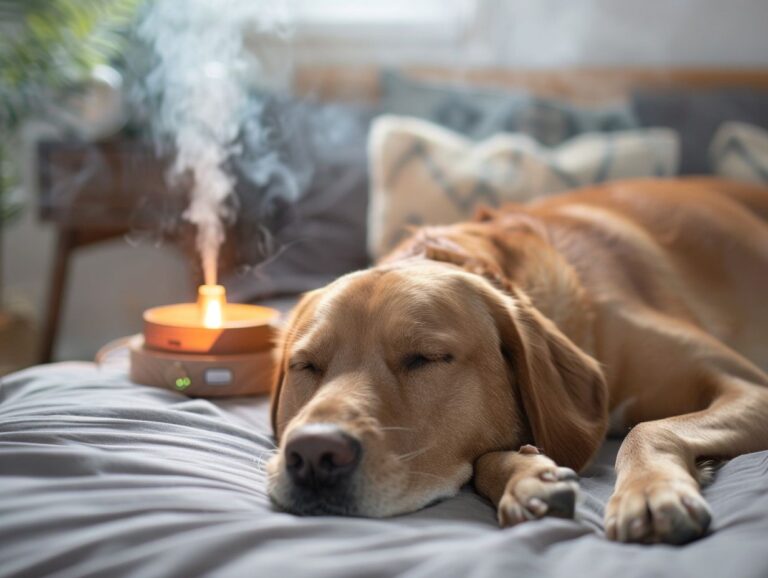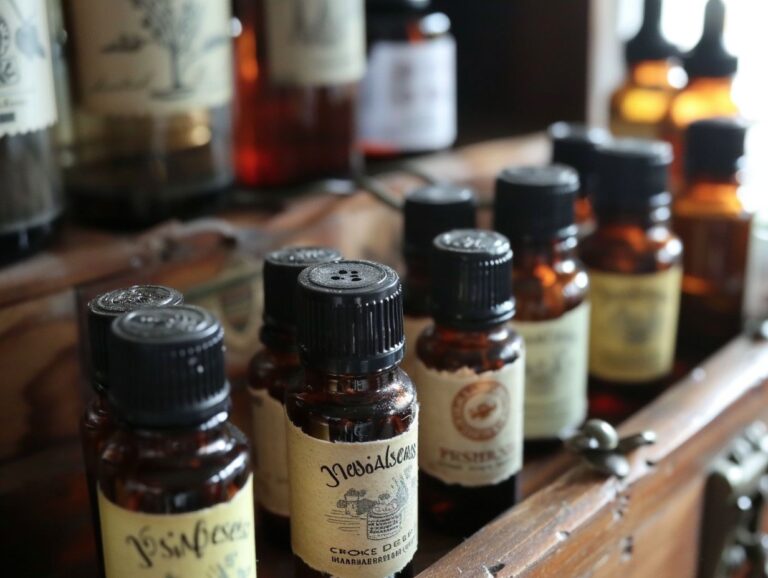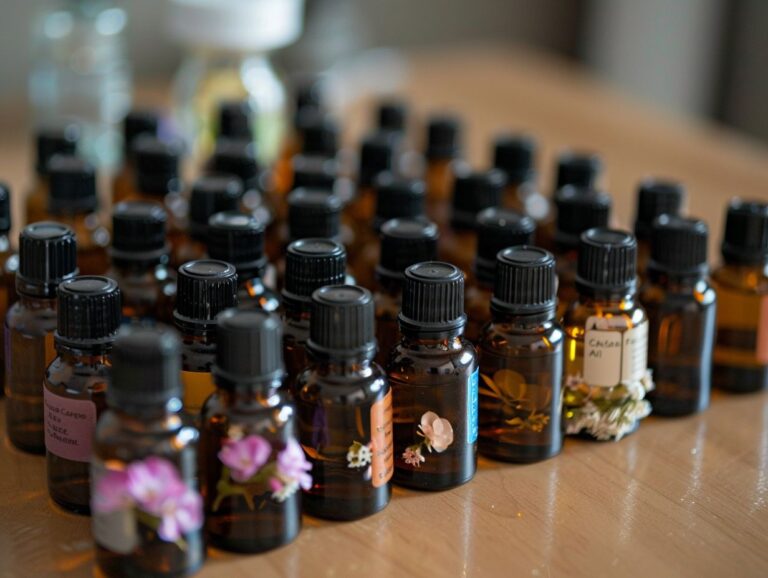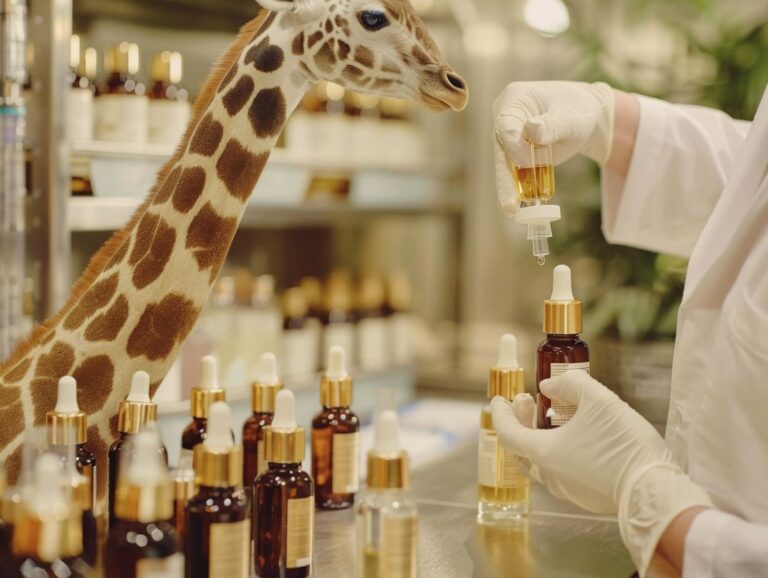Does Aromatherapy Have Side Effects
Aromatherapy is a holistic healing practice that uses natural plant extracts to promote overall well-being.
Discover the benefits of aromatherapy, including stress reduction, improved sleep quality, and immune system support. We will also discuss the different types of aromatherapy, such as inhalation and topical application, as well as potential side effects like skin irritation and allergic reactions.
Learn how to use aromatherapy safely and effectively for optimal health benefits.
Key Takeaways:
What Is Aromatherapy?
Aromatherapy is a holistic healing treatment that uses natural plant extracts, known as essential oils, to promote health and well-being. These essential oils are extracted from various parts of plants and have been used for centuries in different cultures for their therapeutic properties.
One of the core principles of aromatherapy is the belief that the aroma of these essential oils can stimulate the brain and impact emotions and mood. By inhaling or applying these oils, individuals aim to achieve physical, emotional, and mental balance.
Historically, aromatherapy dates back to ancient civilizations like Egypt, where aromatic oils were used for rituals, medicinal purposes, and cosmetics. Today, modern aromatherapy practices integrate scientific research and medical knowledge to enhance its benefits.
Healthcare professionals, such as aromatherapists and physicians, play a crucial role in guiding individuals on the safe and effective use of essential oils. They provide recommendations on proper dilution, application methods, and potential interactions with medications to ensure optimal outcomes.
How Does Aromatherapy Work?
Aromatherapy works by stimulating smell receptors in the nose, which then send messages through the nervous system to the limbic system, the part of the brain that controls emotions.
This process triggers specific responses within the body that can promote relaxation, improve mood, and even alleviate symptoms of stress and anxiety.
When inhaled, the volatile compounds in essential oils interact with olfactory receptors, influencing neurotransmitters like serotonin and dopamine in the brain. Through these interactions, essential oils can help regulate heart rate, blood pressure, and breathing patterns, leading to a holistic calming effect.
On the other hand, when applied topically, the compounds penetrate the skin and enter the bloodstream, offering localized benefits such as pain relief or anti-inflammatory effects.
What Are the Benefits of Aromatherapy?
Aromatherapy offers a range of benefits, including reducing stress and anxiety, improving sleep quality, alleviating headaches and migraines, and even boosting the immune system. Research has shown positive outcomes in managing various health conditions through the use of specific essential oils such as lavender.
Aromatherapy, often referred to as a holistic healing treatment, taps into the power of natural essential oils to promote physical, mental, and emotional well-being. One of the key advantages of aromatherapy is its ability to trigger certain responses in the brain, affecting mood and energy levels positively.
Studies indicate that the inhalation or topical application of lavender essential oil can significantly reduce stress levels, calming the nervous system and promoting relaxation. Its soothing scent not only aids in sleep quality but also has been found to alleviate symptoms of anxiety and depression.
Reduces Stress and Anxiety
Aromatherapy has been found to be effective in reducing stress and anxiety levels in individuals through the inhalation of specific essential oil compounds. By targeting the limbic system in the brain, these oils can promote relaxation and calmness.
One of the most popular essential oils for reducing stress is lavender oil, known for its soothing properties. Inhaling lavender oil has been shown to have a calming effect on the mind and body, helping individuals unwind and de-stress.
Another essential oil that is highly regarded for its anxiety-reducing benefits is chamomile oil, which can create a sense of tranquility and peace when inhaled.
Aromatherapy works by stimulating the olfactory nerves in the nose, which then send signals to the brain. This interaction with the limbic system, responsible for emotions and memories, helps regulate stress responses and induce feelings of relaxation.
Individuals experiencing stress can greatly benefit from incorporating aromatherapy into their daily routines. Whether through diffusers, inhalers, or massages, the power of essential oils in managing stress and anxiety is truly remarkable.
Improves Sleep Quality
Aromatherapy, particularly using lavender oil, has shown promising results in improving sleep quality for individuals. The soothing and calming properties of lavender help in promoting relaxation and creating a conducive environment for better sleep.
Studies have indicated that the inhalation of lavender oil can have a positive impact on sleep patterns by reducing anxiety and stress levels, which are common culprits of sleep disturbances. The gentle aroma of lavender can also stimulate the brain to release chemicals that induce a sense of calmness and tranquility, further aiding in the sleep process. The use of lavender oil in aromatherapy has been linked to improvements in overall sleep duration and quality, making it a valuable natural remedy for those struggling with insomnia or other sleep issues.
Alleviates Headaches and Migraines
Aromatherapy, especially using essential oils like peppermint oil, has been known to provide relief from headaches and migraines. The cooling sensation and analgesic properties of peppermint oil can help alleviate pain and reduce the intensity of headaches.
Peppermint oil, when inhaled or applied topically, can stimulate a sense of relaxation and calmness, easing the tension commonly associated with headaches. Its invigorating scent can also help to uplift one’s mood and improve mental clarity, making it an excellent natural remedy for those struggling with headaches.
The anti-inflammatory properties of peppermint oil can help reduce inflammation, which is often a contributing factor to migraines. By diluting a few drops of peppermint oil in a carrier oil and applying it to the temples or neck, individuals may experience a soothing and numbing effect that can provide relief from the throbbing pain of migraines.
Boosts Immune System
Aromatherapy, with essential oils like tea tree oil, can play a role in boosting the immune system of individuals. The antimicrobial and anti-inflammatory properties of tea tree oil can support overall health and help the body in fighting off infections.
Tea tree oil, also known as melaleuca oil, has been widely recognized for its potent immune-boosting effects through aromatherapy. When inhaled, the volatile compounds in tea tree oil can stimulate the immune system, enhancing the body’s ability to ward off illnesses.
Essential oils, including tea tree oil, work synergistically with the body’s natural defense mechanisms. By targeting harmful pathogens and reducing inflammation, tea tree oil aids in maintaining a robust immune response.
What Are the Different Types of Aromatherapy?
Aromatherapy encompasses different methods of application, including inhalation, topical application, and aerial diffusion. Each type of aromatherapy offers unique benefits and uses of essential oils to promote well-being.
In terms of inhalation, the essential oils are typically inhaled directly or through a diffuser, allowing the molecules to enter the respiratory system and impact the brain quickly. This method is known for its ability to influence mood and emotions effectively. On the other hand, topical application involves the dilution of essential oils with carrier oils and applying them to the skin, where they get absorbed into the bloodstream, providing physical and emotional benefits.
For aerial diffusion, essential oils are diffused into the air, creating a therapeutic atmosphere in the room. This method not only freshens the air but also can help with respiratory issues and improve overall well-being. Each of these techniques interacts with the body and mind in unique ways, enhancing the holistic benefits of aromatherapy.
Inhalation
Inhalation is a common method of aromatherapy where individuals breathe in the aromatic molecules of essential oils. This direct exposure can have immediate effects on the body and mind, providing various therapeutic benefits.
When inhaling essential oils, the olfactory system is immediately stimulated, sending signals to the brain which can trigger emotional responses and impact physiological functions. The process of inhalation is known for its quick absorption of the oils into the bloodstream, allowing for rapid dissemination throughout the body. Through the use of diffusers, the aroma from essential oils can be effectively dispersed in the air, creating a soothing and relaxing atmosphere. This diffusion method not only helps in improving air quality but also enhances the overall experience of aromatherapy for holistic well-being.
Topical Application
Topical application involves applying essential oils directly to the skin, allowing for absorption and localized effects. Dilution with carrier oils is often recommended to ensure safety and avoid skin reactions.
When essential oils are applied topically, they can penetrate the skin and enter the bloodstream, providing therapeutic benefits. The process of absorption through the skin allows for quick relief and targeted action on specific areas of concern. Proper dilution with carrier oils is crucial as undiluted essential oils can be too potent and may cause irritation or sensitization. By diluting essential oils, the risk of adverse reactions is minimized, making them safe for use on the skin. Direct application of essential oils can be beneficial for treating skin conditions, muscle soreness, and promoting relaxation.
Aerial Diffusion
Aerial diffusion involves dispersing essential oil molecules into the air through diffusers, enhancing the atmosphere of a room and providing therapeutic benefits to individuals present. This method can positively impact air quality and mood.
Essential oils have been used for their aromatic and healing properties for centuries, with aerial diffusion being a popular method of application. When diffused, these oils release their natural compounds into the air, allowing them to be inhaled and absorbed by the body. This process not only creates a pleasant fragrance but also can influence emotions and overall well-being.
Diffusing essential oils can help in creating a calming ambiance, promoting relaxation, and even boosting mental clarity. The antimicrobial properties of certain oils can purify the air, making it fresher and healthier to breathe.
Are There Any Side Effects of Aromatherapy?
While aromatherapy generally offers numerous benefits, there are potential side effects to be aware of. These may include skin irritation, allergic reactions, and interactions with medications, highlighting the importance of using essential oils safely.
Excessive use of certain essential oils, especially when directly applied to the skin, can lead to irritation and even chemical burns. Individuals with sensitive skin or a history of skin conditions like eczema may be more prone to these adverse reactions.
Allergic reactions are another concern linked to aromatherapy effects. Some essential oils contain compounds that could trigger allergies in susceptible individuals. It’s crucial to perform a patch test before using a new oil and to cease use immediately if any signs of an allergic reaction arise.
Interactions between essential oils and prescription medications can occur, potentially affecting the efficacy of the drugs or leading to unexpected side effects. Consulting a healthcare professional before incorporating aromatherapy into your routine is advisable, especially if you are currently on medication.
To minimize the risks associated with aromatherapy, diluting essential oils with carrier oils, following recommended dosage guidelines, and opting for high-quality, pure oils from reputable sources are prudent practices. Ensuring proper ventilation during aromatherapy sessions and storing oils securely away from children and pets can further enhance safety.
Skin Irritation
Skin irritation can occur as a side effect of aromatherapy, especially when essential oils are applied directly to the skin without proper dilution. It is essential to exercise caution and perform a patch test before widespread application.
Overly concentrated essential oils can lead to sensitivities, redness, or even blistering, making dilution a crucial step in utilizing them safely.
Dilution involves mixing essential oils with carrier oils like jojoba or coconut oil to reduce their potency. Proper dilution ratios vary depending on the individual, oil, and purpose.
Patch testing entails applying a diluted blend to a small area of skin, typically on the inside of the forearm, to check for any adverse reactions before general application. This precautionary step helps identify any potential allergic responses or sensitivities that could lead to skin discomfort.
Allergic Reactions
Allergic reactions to essential oils are possible in some individuals, manifesting as skin rashes, respiratory issues, or other symptoms. Following safety guidelines and consulting with a healthcare professional can help prevent adverse reactions.
These reactions can vary in severity from mild irritation to more serious conditions requiring medical attention. Some common symptoms of allergic reactions to essential oils include itching, redness, swelling, hives, coughing, shortness of breath, and in severe cases, anaphylaxis.
It is important for individuals prone to allergies to be aware of these potential risks and to seek guidance from a qualified aromatherapist or healthcare provider before using essential oils.
Performing a patch test before full application and diluting oils properly can help minimize the likelihood of an adverse reaction.
Interactions with Medications
Essential oils can interact with certain medications, affecting their efficacy or causing adverse effects. It is crucial for individuals using medications to consult with a healthcare professional before incorporating aromatherapy into their routine.
When essential oils and medications are used together, there is a possibility of unwanted interactions due to the powerful compounds present in the oils. For instance, some essential oils can interfere with the metabolism of certain drugs in the liver, leading to increased or decreased drug levels in the body.
Essential oils may have pharmacological effects that can potentially amplify or counteract the effects of medications. This is particularly significant for individuals with chronic health conditions or those taking multiple medications concurrently.
To ensure safe and effective use of aromatherapy alongside pharmaceutical treatments, it is advisable to provide your healthcare provider with a detailed list of the essential oils you plan to use, as well as the medications you are currently taking.
How to Use Aromatherapy Safely?
To ensure safe and effective use of aromatherapy, it is essential to dilute essential oils properly, conduct patch tests before full application, and seek guidance from a certified aromatherapist or healthcare professional for personalized recommendations.
When diluting essential oils, always remember that less is more. A general guideline is to use a carrier oil, such as coconut or jojoba, and aim for a 2-3% dilution ratio. This means adding around 12 drops of essential oil to 1 ounce of carrier oil. A proper dilution ensures that the essential oil is gentle on the skin while retaining its therapeutic benefits. Before applying any new essential oil, do a patch test by diluting a small amount and applying it to a small area of skin to check for any adverse reactions.
Dilute Essential Oils
Diluting essential oils with carrier oils or water helps reduce their concentration and minimizes the risk of skin irritation or adverse reactions. Proper dilution ensures safe application and enhances the effectiveness of aromatherapy.
In terms of dilution ratios in aromatherapy, it is essential to follow recommended guidelines to achieve the desired therapeutic benefits without any negative outcomes. One common dilution ratio is 2% essential oil to carrier oil, which translates to about 12 drops of essential oil per ounce of carrier oil. For sensitive individuals, a lower dilution of 1% may be more suitable. Diluting essential oils not only ensures a safer experience but also aids in better absorption by the skin, allowing the active compounds to work effectively.
Do a Patch Test
Before applying essential oils widely on the skin, conducting a patch test is essential to check for any allergic reactions or sensitivities. This simple test can help prevent adverse skin responses and ensure safe usage.
To conduct a patch test, begin by diluting the chosen essential oil in a carrier oil (like sweet almond or jojoba) in a 1:1 ratio. Apply a small amount of this mixture on a discreet area of skin, such as the inner forearm or behind the ear.
It is crucial to wait for 24 hours before assessing the test site. If any redness, itching, burning, or inflammation occurs during this period, it indicates a potential sensitivity to the oil. In such cases, avoid using the oil topically and seek guidance from a healthcare professional.
Interpreting patch test results requires caution and attention. Typically, a mild tingling sensation is normal, but any strong reactions should be a cause for concern. Ensure to clean the test area thoroughly after removal to minimize further contact.
Consult with a Certified Aromatherapist
Seeking advice from a certified aromatherapist or healthcare professional is crucial for personalized guidance on using essential oils safely and effectively. These experts can offer tailored recommendations based on individual needs and medical conditions.
Consulting with a certified aromatherapist can ensure that you receive expert advice on selecting the most suitable essential oils for your specific concerns. Their in-depth knowledge of aromatherapy can guide you in creating personalized blends that cater to your emotional and physical well-being. These professionals can help you navigate any potential contraindications or interactions with medications, ensuring a safe and beneficial experience.
Conclusion
Aromatherapy offers a natural and holistic approach to enhancing well-being and managing various conditions. While the potential benefits of essential oils are vast, it is essential to practice caution, especially during pregnancy and when using specific products.
Research has shown that essential oils can aid in relaxation, stress relief, improved sleep quality, and even relief from headaches. It is crucial to dilute essential oils properly, as their concentrated form can be harmful if not used correctly. Understanding the unique properties of each essential oil and their potential interactions is vital for ensuring safe usage. Practicing mindfulness and carefully selecting oils that suit individual needs are key aspects of successful aromatherapy practice.
Frequently Asked Questions
Does Aromatherapy Have Side Effects?
Aromatherapy is generally considered safe, but like any form of treatment, there are potential side effects. Let’s explore some common questions about the side effects of using aromatherapy.
What Are the Common Side Effects of Aromatherapy?
Some of the most common side effects of aromatherapy include headache, skin irritation, and allergic reactions. If you experience any of these symptoms, discontinue use immediately and consult with a healthcare professional.
Can Aromatherapy Interact with Medications?
Yes, some essential oils used in aromatherapy can interact with certain medications. If you are taking any medications, it is important to consult with your healthcare provider before incorporating aromatherapy into your routine.
Are There Any Precautions I Should Take when Using Aromatherapy?
If you are pregnant, breastfeeding, or have any pre-existing medical conditions, it’s important to speak with your healthcare provider before using aromatherapy. Some essential oils may not be safe for certain individuals.
Can Aromatherapy Cause Adverse Reactions?
In rare cases, aromatherapy may cause adverse reactions such as respiratory issues or liver damage. It’s important to always use essential oils according to the recommended dosages and to purchase them from reputable sources.
Are Children Safe to Use Aromatherapy?
Children may be more sensitive to essential oils, so it’s important to be cautious when using aromatherapy around them. Always dilute essential oils and avoid using certain oils, such as peppermint, around children under the age of 6.







One Comment